Find out how your school responded to rape culture claims
We asked Victoria’s top schools how they taught sex education and consent to students. Here’s how they responded.
Education
Don't miss out on the headlines from Education. Followed categories will be added to My News.
A petition calling for better sex and consent education in schools received thousands of anonymous testimonials.
Current and former students from about 60 public and private Victorian schools recounted their horror experiences, which include harassment, rape and abuse, on a website started by former private schoolgirl Chanel Contos.
Anonymous accusations about young men from nearly 40 schools were made, although many did not mention the school their perpetrator attended.
The Herald Sun asked Victorian schools named in submissions — either as the schools of victims or perpetrators — to tell us how they address consent and to provide a message for current and former students.
The messages received show schools are taking the issue seriously and the schools have policies and programs in place to teach students about consent to monitor their effectiveness and survey students.
In many schools the programs start at the junior level as respectful relationships training and carry throughout the senior years.
Most schools welcome contact from any past or present student to discuss these issues in a supportive way.
See how your school responded below.
*Listed in alphabetical order. The Department of Education responded on behalf of public schools.
AQUINAS COLLEGE
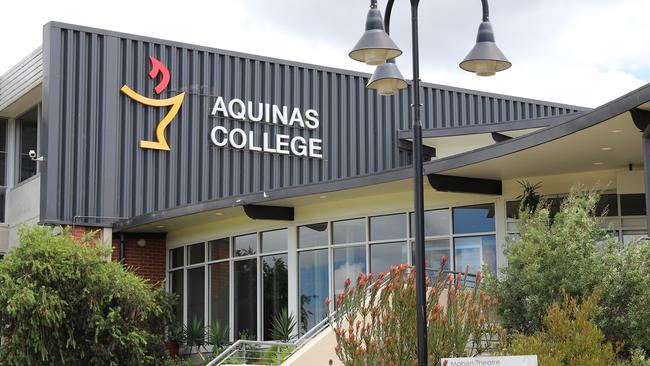
Darren Atkinson
Principal
We were sorry to hear that a former student of Aquinas College was victim of an abusive relationship as a teenager and acknowledge that courage is required to speak up.
We would hope that Aquinas students receive an education that equips them to both recognise abuse and also to feel confident and capable to seek support and advice.
The college incorporates aspects of the Respectful Relationships program into the heath and PE curriculum at years 7 to 10.
We also provide ongoing information to students about child safety, reporting concerns and contemporary wellbeing issues for adolescents at assemblies, through keynote speakers, and other targeted programs.
The college follows the PROTECT Protocol in relation to allegations of sexual abuse as part of our Safe School Policy.
Our approach is holistic and aimed at empowering young people.
Our message around consent is that it is each individual’s right and responsibility to embrace their safety and that of others through respect and an understanding of the role of consent in this process.
Students are explicitly taught the meaning of consent.
BERWICK GRAMMAR
Annette Rome
Principal
Currently our school has a number of programs in place that specifically address matters of consent.
The junior school implements a Child Safety Curriculum from prep to year 6, which began in 2018.
The program emphasises three core safety messages across all year levels — recognise, react and report.
In the senior schools, curriculum programs stem from the Growing Good Men Program (commenced 2017), The SPARC (careers-related program), as well as workshops within the Empowering Young Women and Odyssey programs.
This includes presenters from renowned organisations such as “Elephant Education” and “Your C hoicez” for both boys and girls.
The school also does biannual safety surveys of students. These commenced in 2018 and capture student concerns regarding areas such as bullying, physical safety and other matters relating to respectful behaviour that includes relationships and racism.
All programs were reviewed in 2019, particularly in relation to addressing consent as an issue and a current review is already underway to ascertain what we can do to continually improve our offerings.
CAREY GRAMMAR
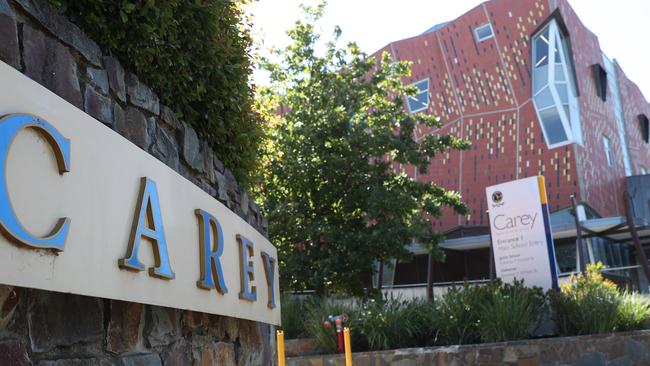
Carey has the safety and wellbeing of all students as its first priority.
We recognise that education about sex, relationships and consent must form a critical part of the curriculum and continue to evolve in response to the changing social environment.
We work proactively with our students to support them in developing positive and respectful relationships.
We have a comprehensive and sequential education program in place where the issue of consent is explored throughout a student’s journey from years 7 to 12.
In our junior schools, we run programs on respectful relationships.
We also undertake parent education programs each year to encourage a collective dialogue as to how we best support the development of our adolescents.
Despite the robust discussions and education we already provide for our students, we are cognisant that we need to do more in order to respond to entrenched unhealthy societal norms that allow unacceptable behaviour relating to consent to continue across Australia.
Carey does not have any knowledge of the claim in the testimony, but would be very keen to support any student, current or past, that may have been impacted in this way.
Schools play an important role in educating young people, however the issue is endemic and needs to be the work of the whole community.
As adults, we all need to take responsibility to do better and call out disrespectful behaviours when we see them.
We would offer support and advice to any student, current or past, that report they have been impacted and also refer the matter to the police if appropriate.
CATHOLIC COLLEGE SALE
Chris Randell
Principal
Catholic College Sale aims to provide a safe and caring environment where all members of the school community feel valued, and have every opportunity to meet their personal and educational potential.
We believe that the social, emotional, moral, spiritual and physical wellbeing of our students is pivotal to their health, safety, learning and success.
Everyone deserves to be treated with respect and dignity.
Sexual harassment or abuse in any form are not tolerated.
All complaints of harassment, bullying or abuse are heard in confidence and taken seriously. The school leadership team, teachers and counsellors work together to ensure the safety of all school members by thoroughly investigating all complaints while respecting the need for confidentiality.
Catholic College Sale provides a range of subjects and initiatives that enable students to learn about respect, human dignity, relationships and individual choice.
Students in years 7 to 10 cover these topics in their health and physical education, and religious education classes. Students in Years 11 and 12 attend an annual safety workshop with Victoria Police that focuses on party culture and consent.
DEPARTMENT OF EDUCATION
Ballarat High
Burwood Girls’ High
Brighton Secondary College
Canterbury Girls’ Secondary College
Camberwell High
Chaffey Secondary College
Dromana Secondary College
Emerald Secondary College
Geelong High School
Greensborough Secondary College
Hoppers Crossing Secondary College
Kyneton Secondary College
MacRobertson Girls’ High School
Matthew Flinders Secondary College
McKinnon Secondary College
Mentone Girls’ Secondary College
Monbulk College
Mooroolbark College
Northcote High
Princes Hills Secondary College
Sandringham High School
Strathmore Secondary College
The Entrance High School
Upwey High
Viewbank College
James Merlino
Education Minister
No state or territory, including Victoria, should be complacent in making sure consent is taught well in classrooms.
We are leading the nation through our Respectful Relationship program that goes directly to the issue of consent. It is proven to make a real difference and is a recommendation of the Royal Commission into Family Violence. It is a program that should be rolled out nationwide.
But we have to listen to students, who say they want and need a greater focus on this issue in the classroom. It is why we will mandate the teaching of consent in all government schools in an age appropriate way. This will ensure it is not just taught, but taught well right across the state.
My department met with Chanel Contos in recent weeks and the commitment I give to her and every student is that we will continue to further improve our resources to ensure they meet the needs of our schools.
Clearly this is an issue across the country. I would encourage every other state and territory and all schools to approach this issue in the same way: listen and take action.
Because our students deserve to be heard.
EMMANUEL COLLEGE
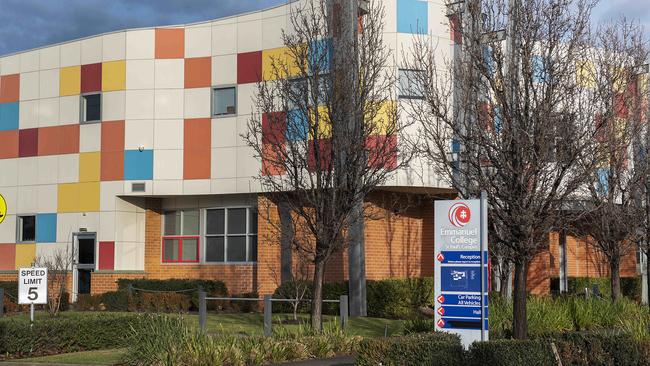
Respectful relationships are not only at the core of Catholic values and teachings, but a necessary element of a proper functioning society
Developing young men and women who respect each other’s fundamental dignity and rights is central to our ongoing education and development approach as a Catholic schooling system.
Catholic schools use a range of materials and programs, including the Victorian government’s Respectful Relationships initiative, in a continuous manner across all year levels to help meet curriculum requirements addressing interpersonal behaviours and respectful attitudes.
Relationships, safety and sexuality education are compulsory focus areas in the Victorian Curriculum for all schools.
Teaching about respect and consent aligns with the beliefs of our Catholic schools as enshrined in the Gospel values, and should not be seen as a one-off or stand-alone exercise.
It is integral to both the ongoing holistic development of students across the spectrum of primary and secondary education along with the respectful relationships expectations set within the curriculum for all schools.
Teaching students about concepts including consent, rights, respect, the body and self awareness, social awareness and others, autonomy, decision-making, and risk-taking, are addressed in an integrated way through the respectful relationships materials used by schools across various year levels.
Critically, we seek to empower young people to participate in what should be an ongoing conversation on the efficacy of existing school respectful relationships’ programs, and the priority they are given in communities, as well as schools.
Catholic education and its schools are clear in the belief that parents and families always remain the first educators for their children.
On this basis, teachers, schools and system leaders need to continually work together with families and wider society to do all we can to address this issue and prevent future harms to young people, who will be our future community leaders.
Further, the CECV, along with all Catholic schools, is committed to ongoing engagement with expert organisations and the state government to ensure our Catholic sector programs and responses represent best practice and latest research.
The Victorian Curriculum identifies the knowledge, skills and understandings for students to be able to engage in respectful relationships.
Teaching and learning about respectful relationships is an essential part of our whole-school approach to promoting gender equity in relationships and challenging of gender stereotypes. The curriculum is age appropriate, strengths-based and grounded in the Christian understanding of the dignity of the person and sacredness of life.
Respectful relationships education in Catholic schools assists students to grow and develop into healthy, mature adults, capable of realising their full potential.
At Emmanuel our respectful relationships curriculum includes related topics in our religious education and health and PE programs, our Life to the Full and Healthy Living Program at Years 7 to 9, our work with Elephant Education in Year 10 and work with Tomorrow’s Women/Men at the Year 12 retreat.
The safety and wellbeing of students is our highest priority.
In line with the agreed PROTECT Protocol outlining reporting obligations for Victoria’s three school sectors, all schools report allegations of sexual abuse to external authorities in accordance with the Four Critical Actions.
This includes reporting to child protection and Victoria Police.
Our school acknowledges, and brings to life in the classroom daily, the cornerstone of Catholic social teaching which is upholding human dignity.
A healthy relationship can only be formed when each other’s dignity is respected.
Any type of unwanted contact with another — sexual or otherwise — needs to be recognised as a form of abuse.
Forcing or pressuring someone to do something they don’t want, or consent to, is sexual assault.
This includes taking advantage of someone when intoxicated, asleep, or under the influence of drugs.
FINTONA GIRLS’ SCHOOL
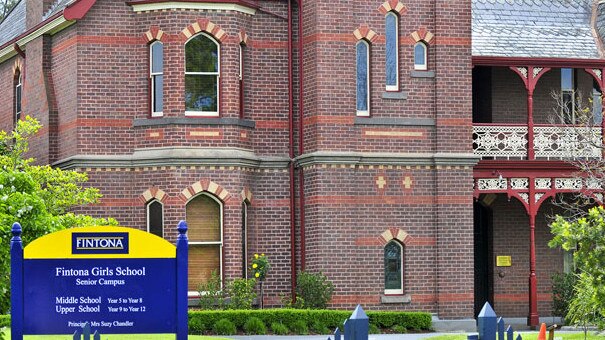
It is certainly distressing that we continue to hear, and young women feel compromised in speaking out, about matters of sexual assault.
Education around partying, consent and one’s rights is an important community wide responsibility, which includes schools and parents who are supported to have open conversations which empower our young people.
The recent media, which began in Sydney, is one as educators that makes us reflect on our programs and practices.
At Fintona we have certainly been discussing and looking at how we can further add student voice and engage our parents in this important conversation.
FIRBANK GRAMMAR
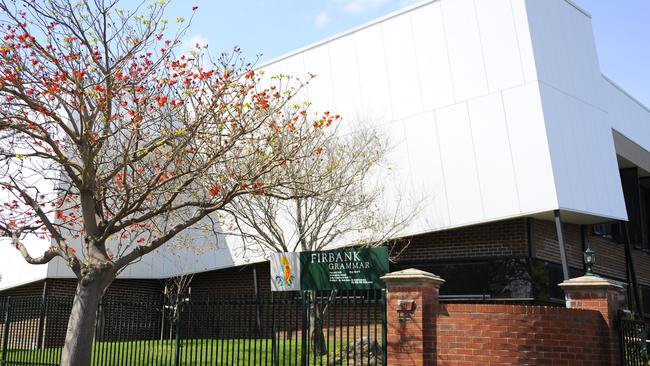
Firbank Grammar School students and staff completely and wholeheartedly support, 2021 Australian of the Year, Grace Tame and her objectives for a wider discussion among the community regarding these issues.
We have a comprehensive education program in place that is available internally and is part of our core curriculum.
We are constantly working to keep this updated, taking advice from all experts in this area including that of consent and respectful relationships.
This is available to all students, staff and parents.
At Firbank the wellbeing of all our students, staff, alumni and the wider community is at the core of everything we do.
We look to our amazing role models such as Grace when she says, “We need to be open, to embrace the conversation, new information, and take guidance from our experiences so we can inform change.”
Any of the community members who maybe facing issues are encouraged to contact our school support network which includes psychology and counselling staff, wellbeing leaders, medical staff and school leaders.
We also encourage persons affected to contact (relevant) organisations.
GEELONG COLLEGE
Dr Peter Miller
Principal
What steps does your school take to respond to allegations of sexual abuse by your students?
Any notification of sexual abuse is handled sensitively and respectfully.
We work closely with Geelong SOCIT (Victoria Police) who assist and advise our course of action. We have reporting and notification obligations that will also be met.
What is your current message to students about consent?
It is imperative that interpersonal relationships are healthy and they require good boundaries. For this to take place it is important to have an understanding of what behaviour is safe and what is not safe as well as what is appropriate and respectful within a healthy relationship. This is in terms of both physical and emotional aspects of the relationship to ensure positive consent.
I also emphasise the importance of safe social contexts and good decisions ahead of the moment when the issue of consent might be challenged.
This is a very layered issue involving many factors including self-protection, good judgment and care for others.
For this reason we look to include parents in the conversations because this is not limited to the context of schools but extends to families and our society in general.
Our children are vulnerable to many things and we have to look to protect them while guiding them in their development.
Parents and schools have to work together with a shared imperative.
GEELONG GRAMMAR
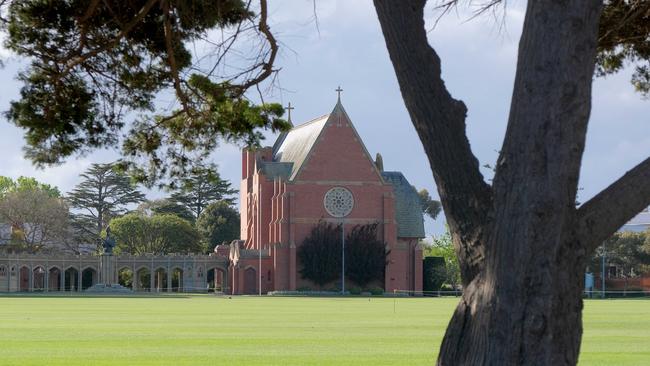
At GGS we are guided by the ‘Resilience, Rights and Respectful Relationships’ teaching model developed by the Victorian government.
In addition, we teach these important topics at every year level and engage external experts to assist with educating students about respectful relationships, including consent.
The Navigate (Years 7-8) and Pathways (Years 10-12) frameworks are taught across all secondary levels and are underpinned by our GGS student wellbeing model.
GENAZZANO COLLEGE
Loretta Wholley
Principal
At Genazzano FCJ College, as an ELC to Year 12 school, our students’ emotional, social, spiritual, physical, and academic growth is our priority.
Appreciating the importance of healthy and respectful relationships is integral for students to flourish and is embedded throughout our curriculum and school policies.
The College engages experienced professionals who are up-to-date on current practice (including the issue of consent).
We provide valuable information to students to empower them to respond to the challenges of our dynamic and complex world.
This approach extends to our parents and guardians through regular seminars and resources as we support their daughter’s learning journey together.
IVANHOE GRAMMAR
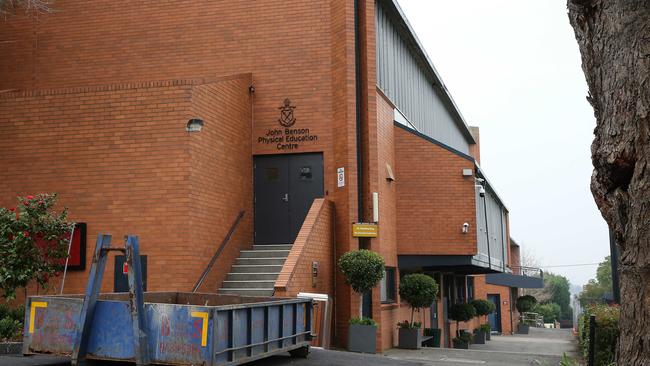
Gerard Foley
Principal
The reports in media are very disturbing and we acknowledge the courageous actions of the young women speaking out, sharing their traumatic experiences.
The safety and wellbeing of our students is our highest priority.
Our school counsellors, heads of campus, mentors, heads of year and school chaplains are here to support our students and alumni at all times.
Respectful relationships and consent are a critical component of our Student Wellbeing Framework and we will continue to review and improve our Respectful Relationship programs, working closely with students and the relevant experts in this area.
Given the current public discussion around consent, we understand parents will be interested in our Respectful Relationship programs and parent resources.
These have been published on our website and our parent portal to assist parents and the school to work together to address the serious issues of consent.
We are all responsible in educating the young people in our care, on the topic of sexual consent and respectful relationships.
We encourage anyone in our community to reach out for our support if needed.
KARDINIA INTERNATIONAL COLLEGE
Since 2017, the college has implemented the Department of Education’s Respectful Relationships program across the school from Years 7 to 10.
At Kardinia International College we treat the safety and wellbeing of our students as paramount.
We have whole-of-school approach to respectful relationships, which includes staff training and procedures regarding how to respond to all student safe issues.
We also have a well-resourced wellbeing team which can offer immediate and ongoing support to students, and facilitate referral to external organisations as appropriate.
The college treats every allegation of inappropriate behaviour by one student towards another seriously, and consistently with our duty of care.
Where concerns about student-on-student behaviour are raised, they are investigated and action taken in accordance with our student wellbeing policies (and obligation as a registered independent school to provide procedural fairness).
Mandatory notifications are also made to Victoria Police and other regulatory bodies where required.
Examples of the college’s relevant student wellbeing policies include:
Our message is the importance of developing and maintaining respectful relationships.
As is appropriate, this includes understanding what active informed sexual consent looks like, how to be clear about personal boundaries and why these need to be respected, and that consent should be given not assumed.
LAURISTON GIRLS’ SCHOOL
Susan Just
Principal
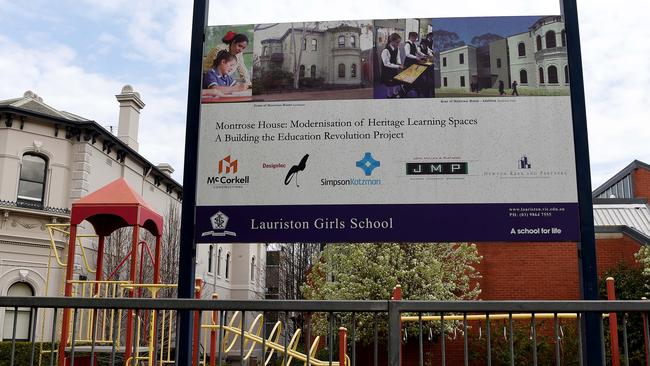
We are saddened by the entire situation and remain with an open door and open heart should this former student need the support of the school community.
The program outlined below is still a firm part of Lauriston’s curriculum and has been for many years. As a result of this recent petition, how we can evolve and improve the education and conversations we’re having around sexual consent remains at the forefront of our minds.
Lauriston Girls’ School commends the young women who have come forward to offer their testimonies of sexual assault and rape.
We acknowledge that schools play a pivotal role in offering a curriculum which includes explicit teaching about sexual consent and, as such, we take our treatment and consideration of this topic very seriously at Lauriston.
To date, Lauriston is not aware of any student past or present who has submitted testimony to the petition live on teachusconsent.com, however, for any Lauriston student who comes forward with a testimony, the school will listen and provide support to meet the student’s personal needs and situation.
It is paramount to us that our students feel comfortable and empowered to voice their views and share their input to what that education needs to look like as we develop a curriculum which is age-appropriate and provides clear information about sexual consent.
Our curriculum includes a variety of resources, such as Respectful Relationships (Victorian Education Department), Sexuality Education Matters (Deakin University), and the Northern Centre Against Sexual Assault (NCASA): A guide for young women.
Additionally, we regularly invite speakers to the school to augment the curriculum taught by our health and PE teachers.
In Year 8, the curriculum covers the topics of understanding sexual harassment, developing respectful practices, what is okay and not okay (sexual harassment) and help-seeking practices.
Healthy relationships and identifying and managing risk-taking activities and situations are covered in year 9.
Consent and the law, along with exploring the different ways to confirm when consent is actually given when engaging in sexual intercourse are topics covered in Year 10.
Topics related to consent continue to be covered in sexual education during Years 11 and 12. As a school, we continue to review our curriculum and we confirm that the understanding of giving and receiving sexual consent and related topics will be included earlier in the secondary school years and revisited throughout the time that our students are with us at Lauriston Girls’ School.
We also acknowledge parents play a significant role in having open and frequent discussions with their children about consent.
Our school has and will continue to provide advice to parents about these challenging conversations.
For Lauriston, this means we ensure clear and consistent messages are shared between parents and our school that;
— Consent must be an explicit agreement with both parties freely choosing to say “yes” to any sexual activity.
— Consent must be mutually agreed to on every single occasion there is sexual activity. Each person must understand what is going to happen and have the choice to stop or change their mind at any time.
Without consent by each party, sexual activity is against the law and becomes sexual assault In addition to the above work and education we have historically conducted in this space, and in response to some of the testimonies we have seen from girls and young women around Australia on teachusconsent.com, we are also working on developing further initiatives, for within our own school community and the communities in which we operate, to educate and continue the conversation and education on consent with young women and men.
LORETO TOORAK
Loreto Toorak is committed to working with our students, in an age-appropriate manner; we listen to our students, we engage with them, and review our curriculum according to feedback. We work in partnership with parents across many issues that concern our community. Highlighting the matter of consent, as challenging as this has been, it has also inspired us to examine more fully the scope and sequence of the ‘whole personal, wellbeing and positive education’ syllabi throughout the school.
At Loreto Toorak we currently include Relationships and Sexual Health Education as part of our curriculum program from Preparatory through to Year 12 on an age-appropriate basis. Such topics include social thinking, positive relationships, child safety (incorporating cyber safety) and specifically the issue of consent, is introduced more explicitly from Year 7.
We invite students from Year 5 to 12 to participate in the Australian Youth Resilience Survey which provides a rich source of feedback to inform and further develop our programs.
MARCELLIN COLLEGE
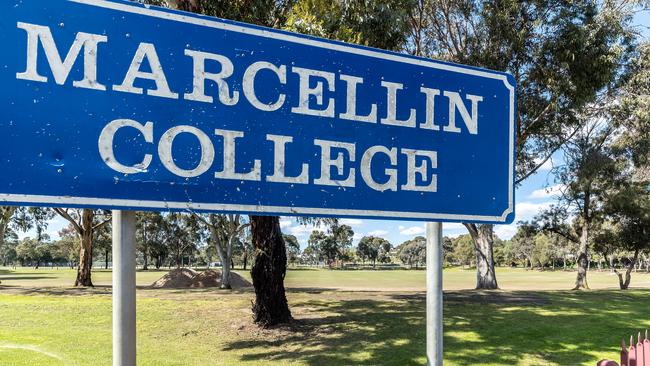
Marco Di Cesare
Principal
Teaching and learning about respectful relationships is an essential part of our whole-school approach to promoting gender equity in relationships and challenging of gender stereotypes. The curriculum is age appropriate, strengths-based and grounded in the Christian understanding of the dignity of the person and sacredness of life.
Respectful relationships education in Catholic schools assists students to grow and develop into healthy, mature adults, capable of realising their full potential.
The College also addresses gender equity and sexual consent through programmes such as:
— Seminar Programme at Year 12.
— Various Guest speakers and presenters.
— A workshop for parents that is running this week in conjunction with OLMC (Sister School) titled “Raising Teens in a Hyper-Sexualised Society”.
— Rights, resilience and respectful relationships.
— Student Wellbeing Programme across Years 7-12.
At Marcellin College the safety and wellbeing of students is our highest priority.
In line with the agreed PROTECT Protocol outlining reporting obligations for Victoria’s three school sectors, Marcellin College reports any allegation of sexual abuse to external authorities in accordance with the Four Critical Actions.
This includes reporting to child protection and Victoria Police (the relevant Sexual Offences and Child Abuse Investigation Team).
A healthy relationship can only be formed when each other’s dignity is respected.
Any type of unwanted contact with another — sexual or otherwise — needs to be recognised as a form of abuse.
Forcing or pressuring someone to do something they don’t want or consent to, is sexual assault.
This includes taking advantage of someone when intoxicated, asleep, or under the influence of drugs.
It is important that we continue to speak about respectful relations and continue the conversation.
Each conversation can make a difference, as Grace Tame, 2021 Australian of the Year and activist and advocate for survivors of sexual assault recently said “One voice, your voice, and our collective voices can make a difference. We are on the precipice of a revolution whose call to action need to be heard loud and clear.“
MELBOURNE GIRLS’ GRAMMAR
Dr Toni E Meath
Principal
As Principal, I want our community to think what we can do to empower our youth and especially our young women.
At MGGS we include the topic of consent in our personal development, health, and physical education programs.
We educate our Grammarians about sexual assault and through our explicit instruction on child safety from an early age we open the conversation about personal rights.
The empowering of women through education has and will remain a collective responsibility.
MELBOURNE GRAMMAR
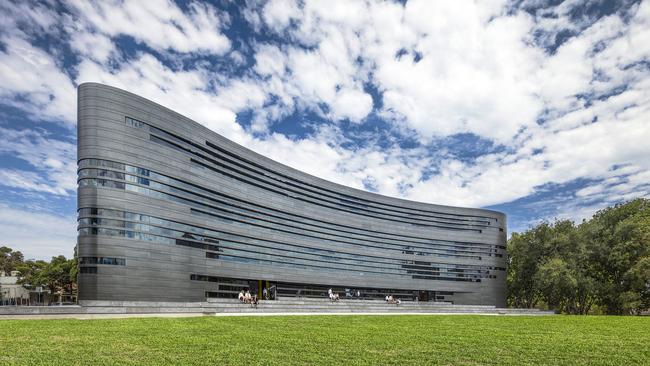
Melbourne Grammar School is aware of an online forum in which young women have made allegations of being sexually assaulted by male students at various private social functions.
Media outlets are reporting that there is at least one claim about a historical incident involving a student from Melbourne Grammar School. We do not have any further information about this matter at this time.
Sexual assault is a heinous crime which is unacceptable under any circumstance.
It must be dealt with the utmost seriousness, and where care and justice for the victim is the highest priority.
I encourage the young woman concerned to report the incident to Victoria Police.
We would fully support any such action.
In keeping with our commitment towards the safety and welfare of all young people, our
counselling team are readily available to support any young person who comes forward.
At Melbourne Grammar School, we want our students – both boys and girls – to gain a deep understanding of the importance of respect for others and the need to behave with a strong moral code in all situations.
This guides our core educational philosophy and approach.
We have numerous strategies designed to develop these ideals. In particular, we have strong, contemporary personal development programs for students in place at each campus.
These provide the framework by which we will continue our work to assist our students to understand how to act in a respectful way throughout their interactions with others.
These programs are under continual review to confirm they sufficiently address the important matters before us all.
Our programs include involving our students in thoughtful, calm, intelligent, progressive
and age-appropriate engagement with issues such as this, and others, that are relevant to the broader Australian community.
Our work with students to specifically understand and recognise ‘consent’ will continue to be a high priority.
The School recognises that we are all the sum of our experiences at school, at home and elsewhere.
All members of the School community have a role to play in addressing all elements of disrespectful behaviour which pervades aspects of our society.
Accordingly, I addressed these issues at school assemblies last week and have set out my expectations to staff.
I have also corresponded with parents outlining the school’s stance, the actions we are taking in relation to the issue, and the important role parents play in addressing the elements of disrespectful behaviour which pervade our society.
We will continue to work with our parents to encourage them to have open and frank discussions with their sons and daughters about respectful relationships, consent and appropriate conduct at private social functions.
Some stories in the media imply that the problem is only found in all male schools.
As a headmaster of coeducational schools, and now a boys-only school at secondary level, I can tell you that I have not found that to be the case.
Nor does it just lie within the independent school sector.
Many young people find navigating relationships difficult regardless of their school setting. The pervasive influence of distorted male and female stereotypes in pornography, entertainment and popular culture media, that has such a powerful impact on teenagers, does not help.
Finally, in response to the question ‘is Melbourne Grammar School doing enough?’
We are all participants in what is, I believe, a welcome and hopefully permanent societal shift towards more respectful and appropriate behaviour towards others. This is an important and challenging agenda, and Melbourne Grammar will continue to do whatever we can to support this goal, to the benefit of our students, the people they interact with, and our society as a whole.
We have numerous strategies in place to guide our students’ moral code and behaviour including, but not limited to, contemporary, age appropriate personal development programs.
What steps does your school take to respond to allegations of sexual abuse by your students?
Any specific allegations will be fully investigated, dealt with the utmost seriousness, and have care and justice for the victim as the highest priority.
More broadly, we have addressed the issues arising from the recent online forum with students and will continue to do so. The importance of respect for others and the need to behave with a strong moral code in all situations guides our core educational philosophy and approach.
What is your current message to students about consent?
Respect towards others must lie at the heart of all human engagement. Consent must be given, not assumed. No always means no
MOUNT EVELYN CHRISTIAN SCHOOL
We commend the women who have spoken out recently in light of Chanel Contos calling for consent to be taught in schools.
The current context provides another opportunity to review our curriculum in this area.
We welcome this opportunity and renew our commitment to working with parents and other community organisations to guide and equip young people to make wise and respectful choices in all areas of their lives.
Mount Evelyn Christian School is committed to shaping young people who can discern and navigate the significant cultural pressures on them.
As a Christian faith community, we believe that all people are made in the image of God, called to respect and honour each person.
We continue to work with students of all ages throughout our school community to understand this biblical truth and how this plays out in their relationships and interactions with each other.
The specific issue of consent is part of a broader conversation in our school around appropriate choices, respectful relationships, and as such happens at various times and places throughout our school.
Examples such as our “Kids with Courage” program in Year 4, “Empowering Girls” program at Year 6, our “Inspiring Girls” Camp and “Man Camp” at Year 8, our extensive Years 7 – 10 health curriculum and most importantly, the pastoral conversations that happen with our staff and students every day, are all opportunities to talk about respect, wise choices and the way we give ‘consent’ in all sorts of circumstances.
These and other instances show that this has been, and continues to be, a priority for our school.
However, as this petition has uncovered over recent weeks, all schools, including our own, need to give careful and enduring attention to these issues.
Our response to allegations of sexual abuse by our students follows our Child Safe Policy.
We encourage any student within our school community to bring specific matters of such abuse, or even more subtle matters of ‘student safety’ to our attention.
They know they are able to do this through our Child Safety Officers.
By doing so, we work to ensure that our school is a safe, respectful and flourishing community for all.
OUR LADY OF MERCY COLLEGE
We commend the young women who have come forward for their courage and we are in solidarity with and support for those who added their voices to the petition.
Our curriculum is continually evaluated to ensure its relevance and that it meets the needs of students.
The voices of young women who have come forward has informed a renewed evaluation our programs.
A high priority for our student wellbeing program is supporting our students as they journey through adolescence.
This support includes teaching students the skills to negotiate and build healthy relationships and build resilience working within the framework of respectful relationships which includes a focus on consent.
More specifically, in addition to the Victorian Curriculum, Our Lady of Mercy College embraces a focus on the development of these understandings through:
— Respectful Relationships focus in Wellbeing/Pastoral curriculum Year 7-12
— Restorative Practices
— Reflection program Year 10-12
— Guest facilitators. A recent example is a workshop for parents in conjunction with Marcellin College titled “Raising Teens in a Hyper-Sexualised Society”.
Our Lady of Mercy College holds the safety and wellbeing of students as our highest priority.
We have strict child safe policies and procedures in place to ensure the care of our students, we comply with relevant state and national regulations regarding the reporting of any form of abuse.
In line with the agreed PROTECT Protocol outlining reporting obligations for Victorian schools, Our Lady of Mercy College reports any allegation of sexual abuse to external authorities in accordance with the Four Critical Actions.
This includes reporting to child protection and Victoria Police (the relevant Sexual Offences and Child Abuse Investigation Team).
SCOTCH COLLEGE
Tom Batty
Principal

Addressing inequity in society and the abuse it fosters requires strong voice.
The first step is often the hero step and, with many, Scotch applauds the young women who have recently spoken out about the sexual abuse and distress they have suffered.
Such frankness brings light into darkness and onto crime.
Schools and other institutions must rethink steps taken. It is clear what has been done is not enough.
It is also clear we are stronger when acting together. With the family unit, the school plays significant role in forming attitudes.
We need to consider what more the school can do to educate boys and support families. Abuse is linked to power. While seeking equity, we must be cognisant of environments and behaviour that exacerbate existing power imbalances and put young people at risk: access to alcohol, availability of illicit drugs, online pornography, unsupervised gatherings, choosing not to see or hear.
Real change, however, comes from the values established and prosecuted within and amid our key social units: the classroom, the family home, the friendship group, the online chat group, the sports team, the workplace.
The school has a number of programmes addressing respectful relationships with women.
The particular issue of consent is addressed in our Year 8 Respectful Relationships programme, which includes talks by our School Psychologist, workshops with an external provider and targeted presentations as part of the Big Ideas Lecture Series.
In Year 9, it is central in our Christian Education unit ‘Respect for Women’.
In Year 10, it is a recurring theme of the Respectful Relationships programme run in collaboration with Methodist Ladies’ College that includes a talk by a former police officer, small group discussion and a parent forum.
Year 12 boys assemble for a presentation by our Police Youth Liaison Officer regarding responsibility and the law.
By mandatory responsibility and through values, the school will pursue any allegation of abuse with relevant authorities.
In 2019, boys, parents and staff were invited to participate in a global research project, Responsible Sexual Citizenship, sponsored by the International Boys’ Schools Coalition and led by Associate Professor Ada Sinacore of McGill University.
The study sought to determine boys’ knowledge and understanding of gender and sexuality, sexual health, consent, healthy and unhealthy relationships, ethics and responsibility when online, and the school’s culture in respect to these.
It also sought to learn from parents and teachers how information is provided to boys, and garner recommendations for action.
Following publication of the research report last year, the school, under the leadership of our school psychologist, has embarked on implementing the findings within the Scotch context, involving boys, teachers and parents.
It is clear we must do more and we will.
Respect for the inherent dignity of each person is the human challenge of our times.
SHELFORD GRAMMAR
Shelford Girls’ Grammar has engaged with Sex Education Australia a well-established, highly experienced and respected provider to partner with our school this year in the provision of sex education sessions for the whole school.
We have made a substantial commitment to engaging this company to run programs for students in both our Junior and Senior Schools and a parent information session.
What is clear from media coverage and personal commentary, is that young people need to receive a more holistic sex education from an earlier age.
The recent issues have confirmed the timeliness of our decision and the need for such expert, sequential education programs.
ST KEVIN’S COLLEGE
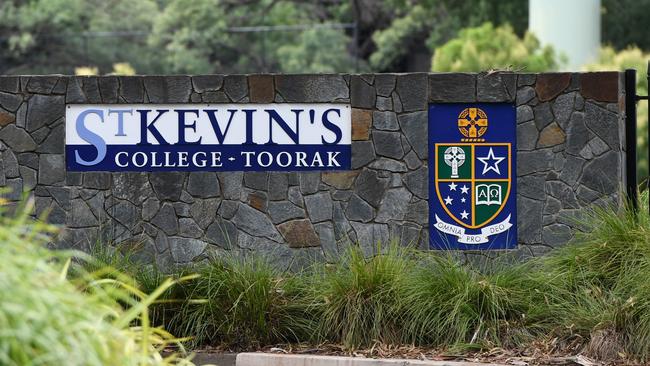
St Kevin’s College is fully committed to supporting our students in their growth spiritually, academically, physically, emotionally and socially.
St Kevin’s College has a variety of classes to engage and enhance the students’ educational growth in understanding and building respectful and healthy relationships.
Specifically, St Kevin’s College follows the Victorian Government’s Respectful Relationships Programs.
Age-appropriate Social and Emotional Learning programs for all students cover relevant topics, such as consent education, by teaching respect for themselves, each other and particularly towards women within the context right relationships and where the dignity and sacredness of the human person is paramount.
The college continues to deepen its commitment to the Respectful Relationships program with a formalised partnership established with Department of Education and Melbourne Archdiocese of Melbourne in 2020.
Importantly, the College also works closely with parents and caregivers to ensure the best education on this topic.
Edmund Rice Education Australia schools generally all ensure that the programs are integrated in the curriculum through subjects such as Health Education, Social and Emotional Learning programs, Religious Education and extra-curricular opportunities through camps, excursions, sport and social justice outreach initiatives.
EREA schools also have partnerships with approved and accredited externally offered programs including; Man Cave Education, The Men’s Project, Docs and Teens, The Hopeful Institute, Vic Ed Building Respectful Relationships and Choicez Media.
EREA schools take very seriously all allegations of sexual abuse made by students and ensure that appropriate authorities are informed such as the Sexual Offences and Child Abuse Investigation Teams (SOCIT) and Commission for Children and Young People (CCYP).
ST PAUL’S ANGLICAN GRAMMAR
St Paul’s Anglican Grammar School offers a comprehensive curriculum which educates about consent and respectful relationships within its Health, Physical Education and Thinking and Learning programs.
In particular, the following units have run for several years:
— All students in Year 8 undertake a unit on Respectful Relationships.
— All students in Year 9 complete a unit on Choices and Decisions, which commences with a presentation which explicitly teaches consent, and is delivered by a psychologist from Gippsland Centre Against Sexual Assault and a police officer.
This is followed up with a further debriefing and exploration of the topics covered to consolidate understanding.
Year 10 elective students undertake a sex education workshop concerning consent with external provider Elephant Ed.
What steps does your school take to respond to allegations of sexual abuse by your students?
Should we receive an allegation relating to sexual abuse within our school community it will be responded to immediately, on an individualised basis tailored to the circumstances particular to the alleged incident. In tandem with our Code of Conduct and Child Safety policies, the School will provide wraparound care to strongly support any student who experiences abuse.
What is your current message to students about consent?
We appreciate that the nature of recent disclosures in the media is causing many individuals to feel upset and concerned, and some affected may be members of our school community.
Our current message to students about consent is clear and unambiguous and we encourage anyone to discuss any issues that arise with a person close to them, and then seek additional assistance or advice as needed.
WESTBOURNE GRAMMAR SCHOOL
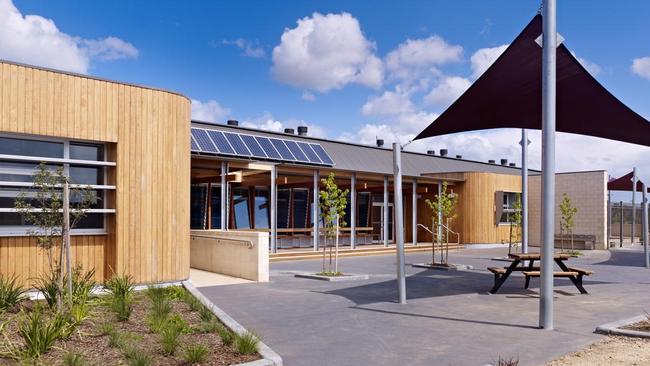
The public debate and nationwide demonstrations relating to gender equality, respectful relationships and consent have highlighted the need for social, political and institutional change.
As a coeducational school, Westbourne Grammar is very mindful of the need to take our responsibilities to our young women and men seriously.
We want to help them to grow and learn together in an environment of mutual respect.
Our school policies and practices focus on respectful relationships, restorative practice, zero tolerance for bullying and harassment including sexual harassment both within the school and as a wider community.
Teaching staff work closely with the students in their care, understanding that this is always a work in progress — an educative process aimed to assist students to be their best in all their encounters.
At the same time, with many young Australians disclosing what has happened to them while at school, calls are being made to focus earlier and more explicitly on discussions around the issue of consent.
In the light of this, what and how we teach our young women and men at Westbourne is a matter for our ongoing and deep attention.
Our pastoral care and wellbeing programs, the support of the school counsellors, chaplain and staff are founded on the principle of providing a safe and secure learning environment for all. Matters relating to gender, sex and sexuality are part of the curriculum from early learning through to Year 10.
In conjunction with explicit teaching in Health, we also have weekly Circle Time in class and Tutor Groups across the school, enabling further discussion around restorative practice, issues,and relationships.
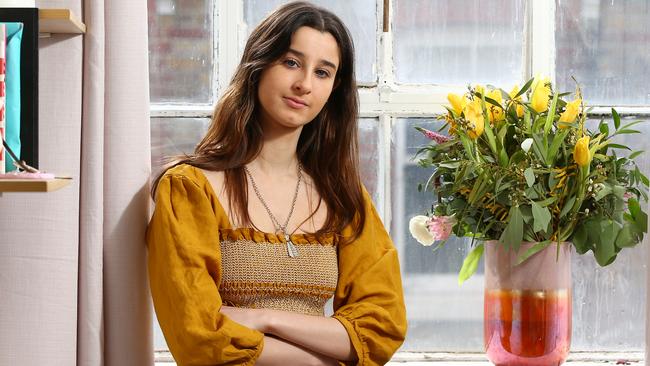
Specifically:
— ELC – Year 6 Safe4Kids Protective Education Program (this program also covers consent).
— Year 5 Unit which incorporates developmental changes and transitions. Students also participate in the Interrelate Moving into the Teen Years program.
— Year 6 Interrelate Moving into the Teen Years Program (includes respectful relationships, decision making, taking responsibility, care of self and others, puberty).
— Year 7 Puberty (Term 4) unit briefly discusses sexuality.
— Year 8 Sex Education unit in Semester 2 – Anatomy, sexuality, relationships — rights and responsibilities exploring the different types of relationships, both positive and negative which then leads into another unit on sexuality, including the concept of consent, safe sex, and STIs (sexually transmitted infections).
— Year 9 Sex Education and contraception (extended from Year 8 unit).
— Year 10 Respectful relationships unit including safe sex, relationships, and sexuality.
Given that the ethical standards and behaviours of parents are highly influential, we recognise that these responsibilities must be shared with the families in our school community.
We are committed to working together to ensure that appropriate information and effective support systems are available for our students.
WHITEFRIARS COLLEGE
At Whitefriars we believe in the inherent dignity of all people. As a community we abhor behaviours which are contrary to this and applaud the courage of those who speak out against them.
Our curriculum is age appropriate, strengths-based and grounded in this Christian understanding of the dignity of the person and sacredness of life.
Learning and teaching focuses on respect and relationships. This whole school approach aims to assist our students to achieve personal excellence and to live in community with integrity as gentle men.
These concepts are reinforced at all year levels through our wellbeing program focusing on empathy, respect, emotional literacy, mindfulness, and relationships. Year 7-12 students also participate in the Australian Youth Resilience Survey which provides a rich source of feedback to inform and further develop our programs.
The safety and wellbeing of all our students is always our priority.
In line with the agreed PROTECT Protocol outlining reporting obligations for Victoria’s three school sectors, Whitefriars College reports any allegation of sexual abuse to external authorities in accordance with the Four Critical Actions. This includes reporting to child protection, CCYP and Victoria Police.
The college’s strong pastoral care system encourages student voice in response to any concerns about their safety and wellbeing.
As a college community we recognise the vital importance of working in partnership with our students and families on current issues such as consent, equality, mental health and racism.
We continue to review and develop educational programs which are aligned with contemporary research and best practice.
XAVIER COLLEGE
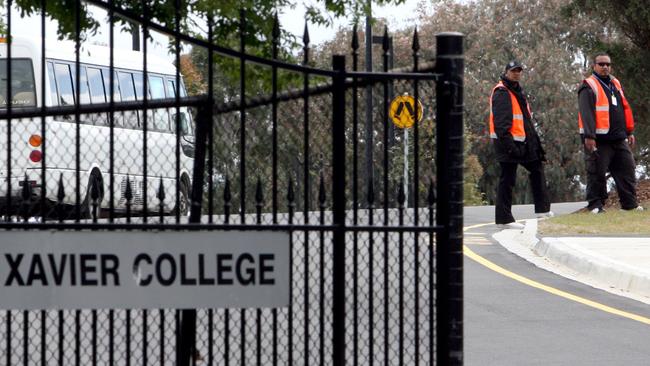
Our student leaders are planning a forum on the subject of consent and gender relations with other young people, especially from neighbouring girls’ schools, with the intention of promoting dialogue and conversation on this crucial subject matter.
Xavier is the only boys’ school out of 300 Victorian schools doing the Bodysafety program which has a good reputation for a sustained approach around the area of respect.
Boys must address their risk-taking behaviours, and thus come to the realisation that it is almost impossible to give consent if you are drunk. Silence is not consent.
We reiterate strongly the theme of personal responsibility.
If a young male can hold a casual job, go for a driver’s licence and consider themselves ready to enter into a relationship, then they must be ready to assume full responsibility around consent.
Xavier promotes a culture where boys are able to talk about their feelings and be vulnerable, where supporting mates with mental wellbeing issues is real and strong, where there is a real awareness of issues around gender and a determination to improve it, where there is genuine sensitivity around LGBTI students.
Xavier has participated in the outstanding ManBox programme initiated by Jesuit Social Services.
YARRA VALLEY GRAMMAR
Consent specific curriculum coverage in the HOPE Curriculum.
Our health curriculum explores this content across each year via investigation tasks and role played scenarios, but predominantly through class discussions where students can express their understandings but also develop an empathy for those around them.
These key presentation methods deliver our age appropriate curriculum and allow students to understand how their peers truly think and feel about these issues.
— Year 7 Health and PE
— Relationships (now a part of our ‘playing it safe’ unit)
— Friendships
— Our own and other’s boundaries
— Standing up for yourself guide. Exploring passive, assertive and aggressive behaviours
— Gender stereotypes and effects on our perceptions and behaviours
— ‘Why do people kiss’ : An age-appropriate introduction to sexual consent and relationship boundaries.
— Year 8 Health and PE – Sexual Education unit
— Traffic lights activity approach for ‘What is OK, and not OK’.
—Exploration of sexual harassment and what this looks like: Flirting vs Harassment.
— Comparisons and role plays (flirting is wanted, reciprocal and makes someone feel good. This must be read appropriately via verbal and body language cues)
Relationships timeline exploring key questions such as:
— Does everybody have the right to decide where his/her limit is at any given time?
— Should the timeline be the same for every relationship?
— What part does communication play in the relationship timeline?
— What influences a person’s ideas about the relationship timeline?
— What happens when two people in a relationship want to be at different places on the timeline?
— Where/who can you go to for help or information about these issues?
— Year 9 Body Mind and Spirit – Respectful Relationships unit
— Identification of the role and effect of real or perceived power in relationships
— Consent and the law in Victoria
— Gender: Perceived expectations.
— Gender based violence including current statistics of this inclusive of domestic abuse
— Pornography and false expectations
— Intimacy and respectful relationships
— Today and changing community attitudes
— Year 10 Active and Able: Love and Relationships unit
— Class discussion of our rights and responsibilities to each other within relationships, and outside.
— Respect, listening etc.
— Harassment and investigations into support services to access for assistance of relationships
— Role play development on peer pressure around the following statements and their consequence: ‘Everyone is doing it’, ‘If you loved me you would do it’
— Agree vs disagree class continuums. Exploring a range of relationship scenarios that lead to in depth class discussion about what is acceptable and what is not
— Exploration and debriefing of components the SBS TV series “The Hunting” tackling themes of misogyny, online exploitation, sexuality and sexualisation, personal boundaries and respect (focus on sexting)
— Consent and the law – class tasks getting students to investigate Victorian laws surrounding consent and sexting in particular and where to find resources for further information.
— Completion of the ‘Respect me’ quiz on http://respectme.org.au/ and exploration of this website and its themes.
— Tasks focusing on ‘qualities’ in a relationship – such as trust.
SCHOOLS CONTACTED WHO DID NOT RESPOND
Braemar College
Caulfield Grammar
Christian College Geelong
Donvale Christian College
Eltham College
Hamilton College
Kilbreda College
Mount Lilydale Mercy College
Methodist Ladies’ College
Sacre Coeur
Southern Cross Grammar
St Catherine’s School
St Columba’s College
St Leonard’s College
Trinity Grammar




